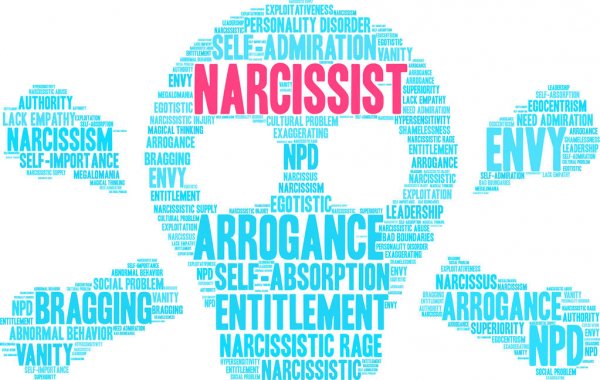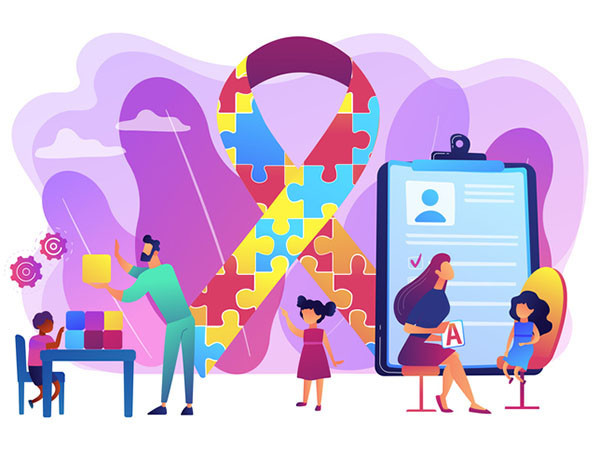It is not uncommon for people with an autism spectrum disorder to also exhibit narcissistic traits. In fact, a recent study found that almost half of all people with autism also meet the criteria for narcissism. This can be a troubling combination, as individuals with both autism and narcissism may struggle to form meaningful relationships and achieve success in life. In this blog post, we will explore the link between autism and narcissism, and discuss some of the challenges that these individuals face.
Contents
What Are Autism And Narcissism?

Autism and Narcissism are a troubling combination. Autism is a developmental disorder that impairs social interaction and communication, while Narcissism is a personality disorder characterized by an inflated sense of self-importance, need for admiration, and lack of empathy.
People with Autism may be more likely to develop Narcissistic Personality Disorder because they have difficulty understanding other people’s thoughts and feelings, which leads to a lack of empathy. They may also have difficulty with social interactions, leading to an isolated lifestyle that can foster narcissism.
People with Narcissistic Personality Disorder may be more likely to develop Autism because they have difficulty regulating their emotions, which can lead to outbursts and meltdowns. They may also have trouble forming relationships, making it difficult for them to learn social skills.
It is important to note that Autism and Narcissism are not the same things, and not everyone who has Autism will develop Narcissistic Personality Disorder. However, the two disorders often occur together, so it is important to be aware of both conditions if you or someone you know is affected by them.
Signs of Autism And Narcissism

There are many signs of Autism and Narcissism, and they can vary from person to person. However, some of the most common signs include:
Difficulty In Understanding People’s Thoughts
There are many ways to show emotion, and people with Autism may have difficulty understanding the emotions that other people are trying to express. For example, if someone is sad, a person with Autism may not understand why they are sad and instead think that they are mad.
Difficulty In Understanding Other People’s Feelings
People with Autism may also have difficulty understanding other people’s feelings. For example, if someone is angry, a person with Autism may not understand why they are angry and instead think that they are sad. There are also cases where people with Autism will take the opposite feeling of what someone is actually feeling. For example, if someone is happy, a person with Autism might think that they are angry.
Isolated Lifestyle
People with Autism may have difficulty interacting with others, which can lead to an isolated lifestyle. This can be a breeding ground for narcissism because it allows the person to focus on their own needs without having to worry about other people’s feelings or thoughts.
Difficulty Regulating Emotions
People with Narcissistic Personality Disorder often have difficulty regulating their emotions, which can lead to outbursts and meltdowns. This can be difficult for both the person with Narcissistic Personality Disorder and the people around them.
Need For Admiration
People with Narcissistic Personality Disorder often have a need for admiration. They may frequently brag about their accomplishments or try to get others to praise them. There are also cases where people with Narcissistic Personality Disorder will take advantage of others in order to get what they want.
Lack Of Empathy
People with Narcissistic Personality Disorder often have a lack empathy, which means that they are not able to understand or feel the emotions of others. This can lead to them being cold and insensitive to the needs of others. Lack of empathy also often leads to a lack of guilt or remorse, which can be harmful to relationships.
Guilt
Sometimes there are cases where people with Autism feel guilty about things that they have no control over. For example, they may feel guilty for not being able to communicate like everyone else or for not being able to make friends. Sometimes there may be cases where people with Narcissistic Personality Disorder feel guilty for the things that they have done, but this is not common.
Causes of Autism And Narcissism

There are many causes of autism and narcissism. Some of these are:
Genetics
Genetics is one of the biggest causes of autism and narcissism. If a person has a parent or sibling who has autism or narcissism, they are more likely to develop the disorder themselves. There are also cases where a person will develop autism or narcissism as a result of a head injury.
Environmental Factors
Environmental factors can also play a role in the development of autism and narcissism. If a person is exposed to high levels of stress or trauma, they are more likely to develop one of these disorders. There are also cases where people will develop autism or narcissism as a result of being raised in an abusive home.
Environment
The environment can also play a role in causing autism and narcissism. For example, if a child is raised in a home where there is little love and warmth, they may be more likely to develop Autism. Alternatively, if a child is raised in a home where they are constantly praised and given too much attention, they may be more likely to develop Narcissistic Personality Disorder.
Brain Structure
There is some evidence that suggests that the brain structure of people with Autism may lead them to develop Narcissistic Personality Disorder. This is still being researched and more information is needed in order to make a conclusive statement. There are also cases where people with Autism will develop other mental health disorders such as Obsessive-Compulsive Disorder (OCD) or Attention Deficit Hyperactivity Disorder (ADHD).
Viral Infections
Sometimes there are viral infections that can lead to the development of autism and narcissism. For example, there is some evidence that suggests that the rubella virus can cause both disorders. There are also cases where a person will develop autism or narcissism as a result of being exposed to mercury. There are still many unknowns when it comes to the causes of autism and narcissism. However, research is ongoing and more information is being discovered all the time.
Negative Impacts of Autism And Narcissism

There are many negative impacts of autism and narcissism. Some of these include:
Social isolation
People with autism and narcissism often have difficulty making friends and maintaining relationships. This can lead to them feeling isolated and alone. There are also many things that can have a negative impact on their mental health, such as depression and anxiety.
Poor Mental Health
People with autism and narcissism are more likely to have poor mental health than those without the disorder. This can be due to a number of factors, such as social isolation, lack of empathy and guilt, and difficulties in relationships. There are other mental health disorders such as OCD and ADHD that are also common in people with autism and narcissism.
Behavioral Problems
People with autism and narcissism can often have behavioral problems. This may include things such as tantrums, aggression, and self-harm. There are also some things that can give rise to criminal behavior, such as stealing and breaking the law. Sometimes there are also cases where people with autism and narcissism will engage in sexual misconduct.
Trouble at School
People with autism and narcissism often have trouble at school. This is because they find it difficult to follow rules and regulations, and they often have difficulty interacting with others. This can lead to them being excluded from social activities, feeling isolated, and having poor academic performance.
Financial Problems
People with autism and narcissism can often have financial problems. This is because they may have difficulty holding down a job due to their behavioral problems or social isolation. They may also spend money recklessly or be unable to manage their finances properly.
Relationship Problems
People with autism and narcissism often have relationship problems. This is because they find it difficult to empathize with others and often have difficulty communicating. This can lead to them having a lot of conflict in their relationships. Sometimes there can be things like affairs and divorce.
Economic Burden
The economic burden of autism and narcissism can be significant. This is because people with these disorders often require a lot of support and assistance in order to live a normal life. They may need help with things such as getting dressed, bathing and eating. This can be costly for both the individual and their family. There can be many other costs as well, such as the cost of medication and therapy.
Self-Harm
Self-harm is another thing that may be common among people with autism and narcissism. This is when a person harms themselves as a way of dealing with their emotions. It can include things such as cutting, burning, and hair-pulling. There are also many things that can have an impact on self-harm, such as mental health problems and social isolation.
Diagnosis of Autism And Narcissism
 The diagnosis of autism and narcissism is a troubling combination. The characteristics of autism can mask the signs of narcissism, making it difficult to identify.
The diagnosis of autism and narcissism is a troubling combination. The characteristics of autism can mask the signs of narcissism, making it difficult to identify.
Both autism and narcissism are on the rise in recent years. There is no one cause for either condition, but there may be a connection between the two disorders.
Narcissists are often attracted to people with autism because they find them easier to manipulate and control. They may take advantage of the autistic person’s lack of understanding of social cues or emotional responses.
To diagnose this condition you should look for the signs of autism along with the symptoms of narcissism. These can include problems with social interaction, a lack of empathy, and excessive self-focus.
People who are diagnosed with autism and narcissism often have difficulty functioning in social situations. They may feel like they are on the outside looking in, and this can lead to isolation and loneliness.
They may also have trouble understanding other people’s emotions or intentions. This can make it difficult to build relationships or maintain them once they are formed.
If you think you or someone you know may be affected by this condition, it is important to get help from a professional. There is no one-size-fits-all solution, but there are treatments that can help.
Treatment for Autism And Narcissism

There is no one-size-fits-all treatment for autism and narcissism. However, some of the most common treatments include:
Therapy
Many people with autism and narcissism find therapy helpful. The therapist will help the person to understand their disorder and learn how to deal with the challenges that come with it. Some of these therapies are also many for the family members of people with autism or narcissism.
Medication
Some people with these disorders may need medication in order to help them manage their symptoms. This could be medication for ADHD, OCD, or another mental health disorder. Sometimes these medications are also meant to be taken in combination with therapy.
Self-Help Groups
There are also self-help groups available for people with these. These groups provide a safe place for people to share their experiences and learn from others who are going through the same thing. The self-help groups are also a great place to find support.
Education and Awareness
The best way to deal with these is through education and awareness. When people understand these disorders better, they are able to more compassionately care for those who have them. There is also more research being done on autism and narcissism, so hopefully, more information will be available in the future.
Support Groups
There are also support groups available for people with these. These groups provide a safe place for people to share their experiences and connect with others who understand what they are going through.
There is no one-size-fits-all treatment for autism and narcissism, but there are a number of treatments that have been found to be helpful. If you think you or someone you know may be affected by one of these disorders, please seek professional help. You can also contact us for more information related to all the disorders.
Conclusion
Autism and narcissism can be a troubling combination. While people with autism may be excessively self-focused, people with narcissism may view others as objects to be used and manipulated. This can lead to conflict and difficulty in relationships. If you are concerned that you or someone you know has autism and narcissism, it is important to seek help from a therapist or counselor who can provide guidance and support.
If you are struggling with autism and narcissism, there is help available. You can also contact us as we provide help for people with an autism spectrum disorder.
A Word From Therapy Mantra
Your mental health — Your psychological, emotional, and social well-being — has an impact on every aspect of your life. Positive mental health essentially allows you to effectively deal with life’s everyday challenges.
At TherapyMantra, we have a team of therapists who provide affordable online therapy to assist you with issues such as depression, anxiety, stress, workplace Issues, addiction, relationship, OCD, LGBTQ, and PTSD. You can book a free therapy or download our free Android or iOS app.


